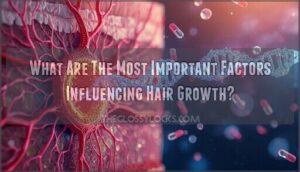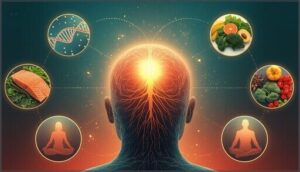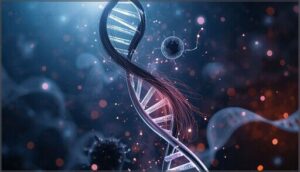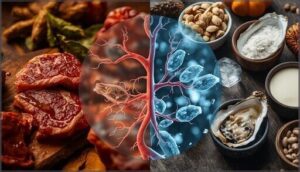This site is supported by our readers. We may earn a commission, at no cost to you, if you purchase through links.
Your hair follicles don’t operate on autopilot—they respond to a complex interplay of signals, from the genetic blueprint you inherited to the hormones coursing through your bloodstream and the nutrients you consume daily. While advertisements promise miraculous growth from a single serum or supplement, the biological reality involves multiple regulatory pathways working in concert, each capable of either accelerating or stalling your hair’s progression through its growth cycle.
Understanding the most important factors influencing hair growth requires examining how your DNA determines follicle potential, how androgens like DHT miniaturize those follicles over time, and how deficiencies in iron, zinc, or essential vitamins can compromise keratin synthesis at the cellular level. Beyond biochemistry, environmental stressors—chronic cortisol elevation, mechanical damage from heat styling, UV exposure—create cumulative damage that disrupts the delicate anagen phase where growth actually occurs.
Table Of Contents
- Key Takeaways
- What Are The Most Important Factors Influencing Hair Growth?
- How Do Genetics Affect Hair Growth?
- What Role Do Hormones Play in Hair Growth?
- How Does Nutrition Impact Hair Growth?
- Which Lifestyle and Environmental Factors Influence Hair Growth?
- Frequently Asked Questions (FAQs)
- What are the most important factors influencing hair growth?
- Which factor is important for hair growth?
- Is stress a factor in hair growth?
- Is there an age limit for hair growth treatments?
- Does hair stop growing after a certain age?
- Can hair loss be reversed?
- What can I do to help my hair grow faster?
- Can scalp massage improve hair growth rate?
- Does blood circulation affect hair follicle health?
- How do hair products impact growth speed?
- Conclusion
Key Takeaways
- Your hair growth depends on five interconnected biological systems—genetic predisposition, hormonal balance, nutritional status, lifestyle choices, and follicle health—that must work in concert, meaning no single intervention can override deficiencies in the others.
- DHT drives androgenetic alopecia by binding follicle receptors and progressively miniaturizing hair shafts during each growth cycle, while estrogen extends the anagen phase and thyroid hormones regulate the metabolic energy required for cell division within follicles.
- Iron deficiency below 30 ng/mL ferritin and inadequate protein intake (below 1.0–1.2 g/kg daily) directly compromise keratin synthesis at the cellular level, triggering diffuse shedding that persists until you correct the underlying nutritional gaps.
- Chronic stress elevates cortisol levels and forces follicles into premature telogen phase (rest), while mechanical damage from heat styling above 450°F, tight hairstyles, and UV exposure cumulatively disrupt the cuticle structure and accelerate breakage beyond what genetics alone would predict.
What Are The Most Important Factors Influencing Hair Growth?
Your hair doesn’t grow in a vacuum—it reacts to a complex interplay of internal and external forces that determine everything from strand thickness to growth rate. Understanding these influences gives you the power to work with your biology rather than against it, targeting the factors you can actually control.
Certain habits, stress patterns, and nutritional gaps can quietly stunt your hair’s growth potential, keeping strands from reaching their full length and vitality.
The five primary drivers of hair growth include genetic predisposition, hormonal balance, nutritional status, lifestyle choices, and the health of your follicles themselves.
Genetic Predisposition and Hereditary Traits
Your inherited hair potential sets the stage before any other factor kicks in, defining follicle size, density, and how long each strand can grow before shedding.
Genetic predisposition influences your risk for androgenetic alopecia and determines baseline hair resilience through keratin gene regulation and epigenetic marks passed from parents.
Family history reveals patterns you can’t override—only work with. The impact of genetics on hair growth can be better understood by exploring heritability and complex traits.
Hormonal Regulation and Balance
Your genes may set the blueprint, but hormones orchestrate the follicle’s daily performance through Hormonal Signaling that controls Hair Cycle Regulation and Follicle Stimulation. Androgens convert to DHT, shortening anagen and driving miniaturization, while Estrogen extends growth phases for fuller density.
Thyroid hormones fuel metabolic tempo, and any Hormonal Imbalance—from stress cortisol spikes to Endocrine System disorders—can trigger shedding episodes that Hormone Therapy or targeted interventions may reverse, restoring Hormonal Influence on Hair through precise Hormone Regulation.
Understanding how hormone regulation mechanisms maintain internal balance is central to explaining these influences on hair growth.
- Androgens drive follicle miniaturization by converting testosterone to DHT, which binds receptors and shortens your growth phase.
- Estrogen prolongs anagen during reproductive years, protecting against thinning until menopause shifts the balance.
- Thyroid hormones regulate metabolic energy essential for follicle cell division; deficiencies cause diffuse shedding.
- Cortisol from chronic stress triggers telogen effluvium, pushing follicles prematurely into rest and increasing daily hair loss.
- Hormone replacement and anti-androgen treatments can stabilize cycles, slowing androgenic thinning and supporting regrowth over months.
Nutritional Status and Diet
Beyond hormonal signals, your follicles need raw materials—protein intake at 1.0–1.2 grams per kilogram daily fuels keratin synthesis, while iron levels below 30 ng/mL ferritin, zinc shortfalls, and B-vitamin gaps trigger shedding and slow regrowth.
Dietary patterns rich in complete amino acids, vitamin C for iron absorption, and antioxidants from A, D, and E enhance Nutrient Availability, turning meal planning into follicle insurance; Supplement benefits emerge when Macronutrient balance or Nutritional Status lags, correcting Nutrient deficiencies before thinning takes hold.
Lifestyle and Environmental Influences
While Nutrition lays the foundation, your Daily Habits and Environmental Factors can sabotage follicle function—chronic Stress Management failures spike cortisol, shoving anagen hairs into telogen effluvium, and Air Pollution deposits Environmental Toxins that suffocate scalp microenvironments.
Protective Hair Care Tips—UV shields, gentle styling, smoke cessation—preserve keratin integrity, turning Hair Care and Maintenance into your shield against the Environmental Impact on Hair.
Hair Growth Cycle and Follicle Health
Your Hair Growth Cycle—anagen, catagen, telogen—orchestrates Follicle Regeneration through Hair Growth Regulation pathways: the Anagen Phase (two to seven years) builds strong Hair Shaft Structure via Dermal Papilla nutrient exchange.
Understanding genetic influences on female hair loss helps you identify whether maternal or paternal heredity patterns are disrupting your anagen phase.
While the Telogen Phase rest (10–14 percent of follicles) precedes shedding, yet chronic disruption triggers Follicle Miniaturization, shrinking Hair Follicle diameter and shortening Growth Cycle Phases until visible thinning demands intervention.
How Do Genetics Affect Hair Growth?
Your genetic blueprint acts as the master architect for your hair’s fundamental characteristics, determining both how long your strands can grow and how densely they populate your scalp and how resilient they remain over your lifetime. While you can’t rewrite your DNA, understanding these inherited instructions gives you the power to work with—rather than against—your biological potential.
The following genetic factors establish the foundational parameters that govern your hair’s growth trajectory and long-term behavior.
Anagen Phase Duration
Your hair follicle’s anagen phase—the active growth window—usually lasts 2 to 7 years, and that duration is largely written into your DNA. This phase determines how long your hair can grow before shedding, with about 85 to 90 percent of scalp hairs actively cycling through cell division at any moment.
Hormone balance and inherited traits regulate these growth cycles, directly influencing hair growth regulation and final length.
Follicle Size and Density
Your genes dictate follicle size—ranging from 0.04 to 0.5 millimeters early on—and scalp health determines dermal papilla cells’ signaling, which directly shapes hair growth patterns and strand thickness.
Larger hair follicles produce more substantial shafts, while hair density averages 100 to 150 follicles per square centimeter, with dense regions exceeding 200.
Follicle damage from inflammation or scarring permanently reduces size, undermining follicle development and overall coverage.
Family History of Hair Loss
If your relatives struggled with thinning, you’re not immune—family history elevates your risk of androgenetic alopecia through inherited baldness genes from either parental line, compounding genetic factors in hair growth over time.
Maternal and paternal patterns often predict onset timing and severity, while ancestral influence from grandparents amplifies early appearance. Knowing these hereditary traits and genetic risk enables you to pursue early intervention, potentially slowing hair loss and disorders before alopecia progresses substantially.
Inherited Hair Color and Texture
Your natural shade and curl pattern spring from genetic factors in hair growth that program melanin production and follicle shape long before birth, dictating pigment distribution and hair structure and function across your scalp.
Hair color genetics and texture inheritance govern:
- Eumelanin versus pheomelanin ratios determining brown-black or red-yellow tones
- Follicle curvature producing straight, wavy, or tightly coiled strands
- Cuticle architecture affecting shine and frizz
- Strand diameter influencing overall density
These hair biology blueprints, embedded in hair follicle cells, steer hair growth and development throughout life.
What Role Do Hormones Play in Hair Growth?
Hormones act as chemical messengers that regulate nearly every aspect of your hair’s growth cycle, from the duration of active growth phases to the size and function of individual follicles.
When these messengers fall out of balance—whether through natural aging, medical conditions, or environmental stressors—your hair responds by thinning, shedding prematurely, or slowing its growth altogether.
Understanding which hormones influence your hair and how they interact with your follicles gives you the insight needed to address underlying causes rather than just symptoms.
Androgens and Dihydrotestosterone (DHT)
Androgens, primarily testosterone and its metabolite dihydrotestosterone (DHT), exert profound hormonal effects on hair growth by binding androgen receptors within follicular dermal papilla cells, triggering gene expression changes that modulate cycle length and follicle miniaturization.
DHT’s higher receptor affinity and prolonged signaling make it exceptionally potent, particularly in genetically susceptible scalp regions, where elevated testosterone levels and subsequent conversion to DHT drive progressive follicular shrinkage, ultimately disrupting hormone balance and compromising anagen duration.
Estrogen and Progesterone Effects
While androgens drive miniaturization, estrogen exerts opposing regulation mechanisms by prolonging your anagen phase and reducing shedding, particularly during pregnancy hormones surges when estrogen therapy effects naturally peak.
Progesterone levels complement this hormone balance through antiandrogenic properties that protect the hair follicle from miniaturization, and both hormones fluctuate across your menstrual cycle, creating predictable hormonal effects on hair growth that you can track and potentially leverage.
Thyroid Hormone Imbalances
Your thyroid hormones coordinate metabolic regulation mechanisms across follicular cells, and hypothyroidism effects manifest as diffuse thinning when T3 and T4 levels drop, disrupting hair growth cycles that depend on steady cellular turnover.
Thyroid disorders stemming from autoimmune responses like Hashimoto’s require thyroid medication for hormone replacement, restoring the hormonal effects needed to maintain hair health and resume normal follicle function.
Hormonal Changes With Age
As you move through your third decade and beyond, growth hormone and IGF-1 levels drop steadily, while testosterone gradually decreases in men and estrogen plummets during menopause in women.
Creating age related changes that thin your hair and slow follicle vitality through hormone decline, thyroid shifts, and sustained cortisol impact that disrupt the delicate balance your aging and hair loss patterns reveal.
How Does Nutrition Impact Hair Growth?
Your hair follicles function as miniature manufacturing centers, and like any biological factory, they require specific raw materials to produce healthy keratin strands at ideal rates. When your dietary intake fails to provide adequate protein, essential minerals, or critical vitamins, follicular activity slows, growth cycles shorten, and structural integrity deteriorates.
Your hair follicles are biological factories that need specific nutrients to produce healthy keratin—without them, growth slows and strands weaken
The following nutritional components represent the most significant determinants of hair growth velocity and strand quality.
Protein and Keratin Synthesis
Your hair’s strength begins with keratin synthesis, where dietary protein fuels the assembly of fibrous structural chains through complex protein folding pathways within epithelial cells, directly linking nutrition and hair health to follicular biology and keratinization processes that govern keratin turnover, filament assembly, and the amino acid role in building resilient keratin structure essential for sustained hair growth.
The process involves several key steps:
- Ribosomes translate your dietary protein into keratin polypeptides that pair and coil into intermediate filaments
- Cysteine-rich amino acids forge disulfide bonds, locking filament networks into place
- Chaperone proteins guide proper folding, preventing weak or brittle strand formation
- Parallel filament arrays align in the cortex, resisting breakage and mechanical stress
- Adequate protein intake sustains continuous keratin production, supporting healthy growth cycles
Iron and Zinc Deficiencies
Depletion of essential minerals such as iron and zinc represents a critical nutrient imbalance that directly compromises follicular function, triggering diffuse hair shedding when hemoglobin synthesis falters and oxygen delivery to your scalp tissues diminishes, while zinc deficiency impairs protein synthesis and DNA transcription during the anagen phase, undermining keratinocyte activity and follicle immune protection.
| Deficiency | Mechanism | Clinical Signs |
|---|---|---|
| Iron | Reduces hemoglobin, limiting oxygen transport to follicles and impairing mitochondrial energy production | Pale nails, fatigue, increased shedding, restless legs |
| Zinc | Disrupts protein synthesis, cell division, and immune defense in follicles | Scalp alopecia, brittle nails, dermatitis, taste impairment |
| Combined | Compounds growth cycle disruption, slowing anagen progression and prolonging telogen | Thin, sparse hair with delayed regrowth |
| Iron absorption | Enhanced by vitamin C, inhibited by phytates in grains | Variable serum ferritin levels |
| Zinc bioavailability | Higher from animal proteins; legumes require soaking to reduce phytate interference | Slower recovery without mineral supplements |
Iron absorption from heme sources in red meat and shellfish surpasses plant-based non-heme iron uptake, while adequate zinc from dairy, meat, and legumes enhances your follicle’s regenerative capacity—correcting these deficiencies through targeted mineral supplements often restores hair density and reduces shedding within months, underscoring nutritional factors for hair as foundational elements influencing hair growth.
Essential Vitamins (A, B, C, D, E, Biotin)
Your follicles require a broad spectrum of micronutrients to sustain keratinocyte division and structural integrity—vitamin A benefits sebum secretion yet excess disrupts keratin deposition, whereas vitamin C role enhances collagen synthesis and iron bioavailability, vitamin D impact activates follicle cycling receptors, vitamin E effects protect against oxidative damage, and biotin supplements fortify keratin infrastructure when nutritional factors for hair remain deficient.
Collectively determining nutrition for hair and factors influencing hair growth.
Hydration and Water Intake
Your fluid balance directly regulates scalp moisture and nutrient delivery to hair follicles, requiring roughly two to three liters daily from beverages and water-rich foods to sustain hair elasticity and prevent dryness-related breakage.
Adequate hydration levels support hair growth by maintaining blood flow, while chronic dehydration compromises hair health and wellness through scalp irritation, requiring consistent water intake for ideal nutrition for hair and thorough hair care.
Which Lifestyle and Environmental Factors Influence Hair Growth?
While genetics and hormones, and nutrition establish the biological foundation for hair growth, your daily habits and the environment surrounding you exert considerable influence over whether your follicles operate at their peak capacity or fall short of their genetic potential.
Chronic stress, insufficient sleep, exposure to environmental pollutants, mechanical styling practices, and ultraviolet radiation represent modifiable factors that can disrupt the hair growth cycle, trigger premature shedding, or diminish follicular function through cellular damage and inflammatory pathways.
Understanding these lifestyle and environmental variables enables you to make informed choices that either support or sabotage your hair’s health trajectory.
Stress and Cortisol Levels
When chronic stress floods your system with cortisol, it can shift your hair follicles from active growth to premature shedding, shortening the anagen phase and slowing regrowth.
Stress management through exercise, mindfulness, and consistent routines helps lower resting cortisol levels and promotes healthier hair growth, though individual responses vary based on genetics, age, and coping style, making tailored stress-level monitoring through saliva or hair cortisol measurement valuable for tracking your progress.
Sleep Quality and Rest
Your sleep patterns directly govern hormonal balance and tissue repair, with 7 to 9 hours nightly supporting ideal hair growth and minimizing hair loss through reduced stress levels and stabilized circadian rhythms.
Key factors influencing hair growth during rest include:
- Sleep efficiency above 85 percent ensures follicle regeneration
- Shortened sleep latency (10 to 20 minutes) signals healthy relaxation techniques
- Minimal wake events preserve dream cycles critical for cellular restoration
Smoking and Pollution Exposure
Your exposure to cigarette smoke and air pollution effects directly assaults the hair growth process through toxic damage pathways that constrict scalp blood vessels, increase oxidative stress levels, and deposit heavy metals onto your hair follicle structures, leading to follicle degradation, scalp irritation, and accelerated shedding.
That systematically undermines hair health—factors influencing hair growth you can control through cessation and environmental awareness.
Mechanical Damage From Styling
Your aggressive brushing techniques, high heat styling over 450°F, and tight hair ties actively fracture the cuticle, create microbreaks along the shaft, and generate sustained tension that weakens your hair follicle, triggering breakage, thinning, and accelerated hair loss that undermines scalp health and disrupts the natural hair growth cycle you’re working to protect.
- Wide-tooth combs reduce snagging and minimize root tension during detangling
- Thermal protectants lower surface temperature impact and preserve cuticle integrity
- Fabric-covered ties distribute tension evenly, preventing breakage at the base
- Flexible-bristle brushes reduce pulling stress and daily microbreaks on individual strands
Sun Exposure and UV Damage
Ultraviolet radiation from the sun breaks down keratin proteins through photooxidation effects, roughens your hair cuticle, and accelerates pigment loss while drying out each strand—yet sunburned scalp tissue disrupts follicle growth and compounds stress on your hair health.
UV protection methods like broad-spectrum sunscreen benefits your scalp health directly, while hats and leave-in treatments preserve structural integrity during peak exposure hours.
Frequently Asked Questions (FAQs)
What are the most important factors influencing hair growth?
Your hair growth hinges on genetics, hormones, nutrition, and lifestyle.
Follicle size, growth patterns, and scalp health stem from inherited traits, while hormonal balance and diet directly influence hair texture and vitality.
Which factor is important for hair growth?
Your genetics establish growth patterns, follicle size, and hair texture, while hormones, nutrition—especially vitamins and minerals—and scalp health collectively determine nutrient uptake, cycling rhythms, and the overall robustness of each hair follicle.
Is stress a factor in hair growth?
Yes, chronic stress disrupts your follicle cycling by elevating cortisol levels, which prolongs the resting phase and accelerates hair shedding, while stress hormones interfere with neurotrophic factors essential for healthy hair growth.
Is there an age limit for hair growth treatments?
Most treatments require you to be at least 18 years old, though age thresholds and treatment eligibility depend on individual health, scalp condition, and specific therapy rather than an absolute cutoff.
Does hair stop growing after a certain age?
Like a watch that doesn’t stop but ticks slower, your hair growth doesn’t cease with age—rather, the anagen phase shortens, follicles produce finer strands, and maximum hair length decreases as growth cycle changes accelerate.
Can hair loss be reversed?
Reversal depends on the cause—minoxidil and finasteride support hair regrowth and follicle revival in androgenetic cases, while correcting nutritional deficits or treating telogen effluvium often allows for complete scalp restoration and hair renewal through targeted hair cycle interventions.
What can I do to help my hair grow faster?
You can’t force hair follicles to defy genetics, but you can enhance your growth potential through a healthy diet rich in protein and iron, gentle hair care practices, scalp massage, stress management, and consistent sleep—supporting your hair’s natural cycle.
Can scalp massage improve hair growth rate?
You can boost hair thickness through scalp massage by applying mechanical stress to hair follicles, which enhances blood circulation and stimulates dermal papilla cells, improving scalp health and supporting growth patterns when practiced daily.
Does blood circulation affect hair follicle health?
Can your follicles thrive without adequate perfusion? Yes, blood circulation directly affects hair follicle health by delivering oxygen, nutrients, and growth factors essential for follicular biology and physiology, regulating anagen duration and keratin synthesis.
How do hair products impact growth speed?
Hair products containing scalp treatments and growth stimulants may accelerate hair growth by improving microcirculation, delivering amino acids to the hair follicle, and protecting against mechanical damage through conditioning agents in your hair care routine.
Conclusion
You can’t “hack” your way to healthier hair—no single supplement will override the most important factors influencing hair growth, which operate through interconnected biological pathways requiring simultaneous optimization.
Your follicles demand adequate androgens without excessive DHT conversion, sufficient iron and protein for keratin synthesis, cortisol regulation to prevent telogen effluvium, and protection from mechanical stressors that damage the cuticle layer.
Address these systematically rather than chasing miracle cures, because your genetic blueprint sets the ceiling but your daily choices determine whether you’ll reach it.












